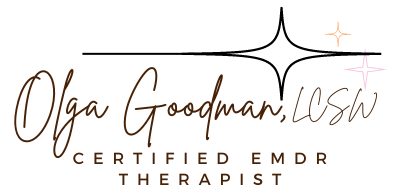
For a long time, I thought I had a pretty great childhood. And in many ways, it was. My basic needs were met—I had food, shelter, parents who were physically present, we had fun vacations together, and I knew my mom loved me. So when I started struggling with anger and anxiety, I thought something was wrong with me. I believed I was just too sensitive, too reactive, too much.

I majored in psychology to understand “what was wrong with me.” As I was learning about family dynamics, I realized that what I thought was a close relationship with my mother was actually enmeshment. What I was told was my “difficult character”—the reason my father had his rage episodes—was actually a family-wide attempt to avoid conflict neither of my parents knew how to handle. Neither of them were comfortable with big feeling, theirs or mine.
It took me years to understand that this was attachment trauma. Not in the obvious way of neglect or abuse (although, this also happened), but in the subtle, insidious way of inconsistent emotional support, invalidation, blurred boundaries, an environment where my feelings weren’t welcome and acceptance was conditioned on me abandoning rebellious and “needy” parts of myself.
What Is Attachment Trauma?
Attachment trauma happens when early relationships—especially with caregivers—are unstable, inconsistent, or harmful. It doesn’t always look like outright neglect or abuse. Sometimes, it’s the experience of being responsible for a parent’s emotions, of being the “good” child to keep the peace, or of being shamed for having needs. Sometimes it results from loss, for instance, parental death, divorce, serious illness, substance use, frequent moves, early adoption, the list goes on.
As kids, we depend on our caregivers for safety, emotional regulation, and love. When those needs are met unpredictably, or only under certain conditions, we learn to adapt in ways that can shape us for life. We might become anxious and clingy, always seeking reassurance. Or we might shut down and avoid intimacy altogether.
The Lasting Impact of Attachment Trauma
If you’ve experienced attachment trauma, it doesn’t just stay in childhood. It echoes into adulthood, shaping how you connect with others, how you react to stress, and how you see yourself. Some common struggles include:
- Fear of abandonment or rejection – You might find yourself clinging to relationships, even unhealthy ones, just to avoid being alone.
- Difficulty trusting others – You might keep people at a distance, assuming they’ll hurt or disappoint you.
- Emotional dysregulation – Intense mood swings, deep anxiety, or feeling like your emotions control you instead of the other way around.
- Low self-esteem – A belief that you are inherently flawed, unworthy, or difficult to love.
- Repetitive relationship patterns – Finding yourself in toxic dynamics that feel eerily familiar.
Healing from Attachment Trauma
The good news? You’re not stuck. Attachment wounds can be healed, and you don’t have to stay trapped in old patterns. Here’s what’s helped me and many others:
- Recognizing the Patterns – Understanding how attachment trauma shaped me was a huge step. It wasn’t that “something was wrong with me—I was just responding to old survival strategies.
- Therapy and Support – Group and individual therapy played a huge part in my ability to build secure attachment as an adult.
- Building Safe, Healthy Relationships – Seeking out emotionally available people helped rewire my brain’s expectations of love and connection. You cannot heal relational trauma in isolation.
- Practicing Emotional Regulation – Learning mindfulness, self-soothing techniques, and healthy coping skills, without exaggeration was a life changing.
- Self-Compassion – The hardest, but most important step: recognizing that my struggles didn’t make me broken. They made me human.
For years, I carried a story that my anxiety and anger meant I was defective. My avoidant attachment cost me relationships and caused so much pain, leaving me feeling like I’m broken.
But healing has shown me a different story—one where I wasn’t the problem, but a child doing their best to survive a complicated emotional landscape. And now, as an adult, I have the power to unlearn, to heal, and to build relationships that are truly safe.
Attachment trauma doesn’t have to define us. It’s part of our past, but it doesn’t have to be our future.
El Cajon, CA 92020
